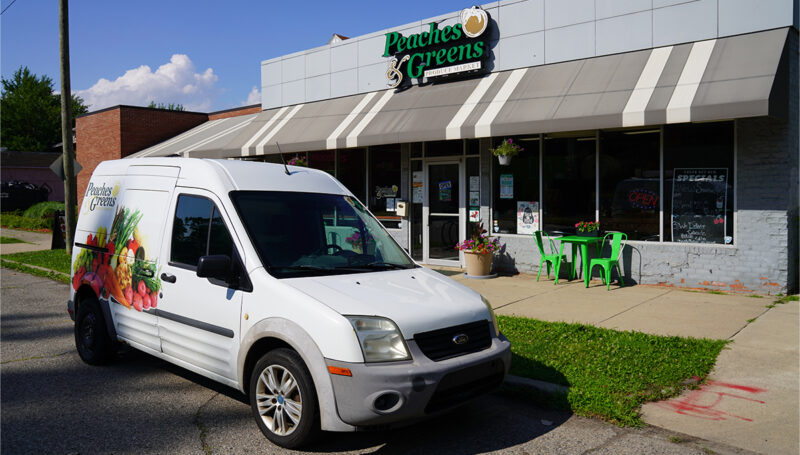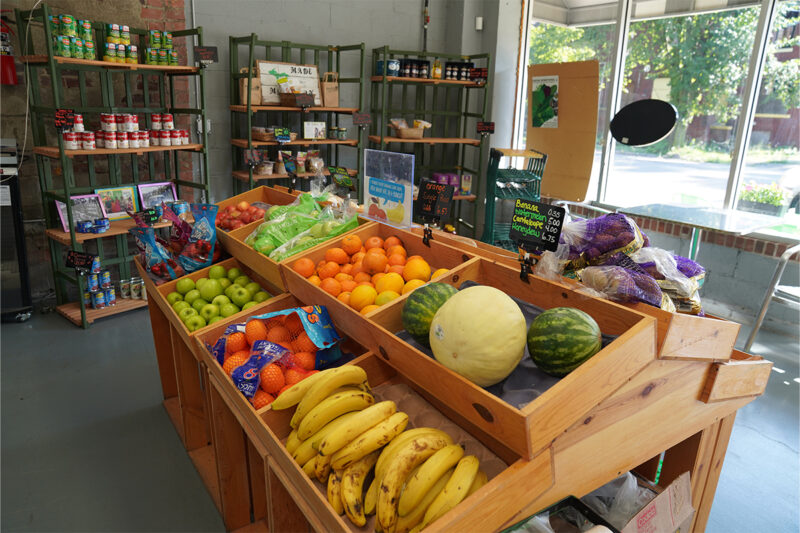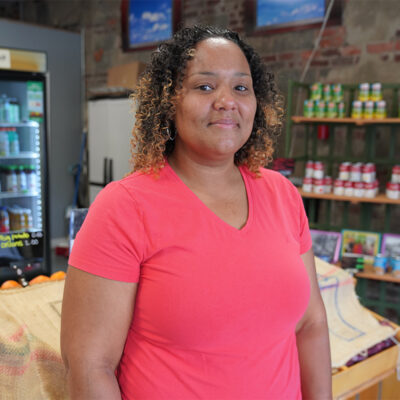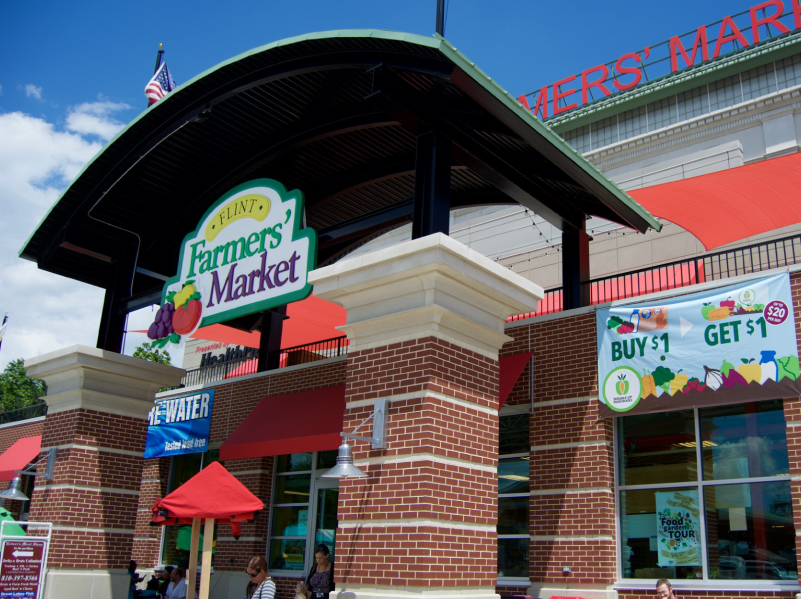Peaches & Greens: A True-to-Detroit Neighborhood Produce Market

Some business owners have a dream — an idea so vivid that they’ll stop at nothing to make it a reality. For others, it’s a need that is so stark and a demand so evident that — even if they have to wrestle their idea into submission — they’ll find a way to bring it into the world. Peaches & Greens, a Detroit neighborhood market, produce delivery service, and community space, falls into the latter camp.
As a longtime resident of the area, Lisa Johanon, Founder and Executive Director of Central Detroit Christian Community Development Corporation (CDC), was a first-hand witness to the lack of accessible quality produce in the neighborhood. “I felt there was a real need – because we all live in the community – and I was raising my kids and I watched stuff locally and there was nothing,” she says. “There was no place to buy affordable produce. You could get fresh, or you could get affordable – but you couldn’t get both.”
As a community development corporation, CDC normally works to stabilize affordable housing options, but Johanon saw an opportunity to buy the neighborhood dry cleaner when it was sold at auction as part of the city’s nuisance abatement program. Purchased for a nominal amount and converted to a grocery and kitchen space largely through volunteer labor, Peaches & Greens opened as a neighborhood produce market in November 2008. “If you remember 2008, it was a really bad year for Detroit,” says Johanon. “In the geography where CDC works, there were something like 25 liquor stores and no grocery stores. And even though it was huge news that this was here, the fact that it was in a low-income, urban neighborhood left a lot of people skeptical that the model could work at all,” she adds. “At the time, no one was investing in low-income urban neighborhoods. Like, why would you do that?” she asks with sarcastic incredulity.
It’s probably not surprising, she adds, that, much as the plan’s detractors had predicted, the market was not initially “wildly successful.”
But Peaches & Greens benefited from a stroke of good timing when it “got caught up in some really good publicity” with the release of a 2009 federal report on food deserts that made the claim it was easier to buy fast food in Detroit than it was to buy a banana. “We had this thing, and it was a real felt need in the neighborhood, and we started getting all this national attention that really put CDC on the map,” says Johanon. Policymakers began to look to neighborhood markets like Peaches & Greens as viable oases to interrupt so-called food deserts. “The [Michigan] Governor’s Office came, and they wanted to design a model from how we do our deliveries,” recounts Johanon. “We had a press conference and the Governor and the Mayor of Detroit were there, ready to ride in the produce truck. Michelle Obama stopped by, too — that really put us on the map!”

While the publicity certainly drew attention to the Peaches & Greens model, Johanon and store manager Tabitha Ramos take pains to point out that innovation and recognition of the store’s position as a community hub are what have kept the store operational through the Great Recession, the COVID-19 pandemic, and periods of high inflation. By adapting to the community’s unique needs, Peaches & Greens has been able to differentiate itself and expand its services to respond to broader neighborhood concerns.

Tabitha Ramos, Store Manager, Peaches & Greens
One of those concerns is the number of seniors in the vicinity of the store who, because of mobility and transportation issues, are often still without access to healthy food choices. Shortly before the pandemic began, Peaches & Greens purchased a delivery truck, which they have used primarily to service senior homes and centers in the surrounding area. “Two years ago, we started delivering to multiple PACE [Programs for All-inclusive Care for the Elderly] sites,” says Ramos. “We drop off produce — apples, oranges, bananas — by the case.” In fact, just a few years ago, produce truck deliveries made up the bulk of Peaches & Greens’ business. Recently, the store has introduced a smoothie bar to attract neighbors and summertime foot traffic, and Ramos plans to expand Peaches & Greens community offerings to bring more neighborhood folks to the store. “We do outside and inside events. It could be reading to kids or inviting the kids to read,” says Ramos. “We plan to do Game Night every Friday. We pull out a ton of games and put some outside and some inside and people come by and play.”
To the charge that these practices encourage loitering, Ramos responds with an emphatic “Yes!” She adds, “We want people to feel comfortable being here. We’ve made a lot of community connections that way.”
A big draw to Peaches & Greens is the availability of Double Up Food Bucks. Double Up, available at more than 230 Michigan grocery stores and markets, is a nutrition incentive program run by Fair Food Network that provides a one-to-one match on SNAP consumers’ purchases of fruits and vegetables. Peaches & Greens has offered Double Up Food Bucks to its customers using SNAP since the program began in 2009, and it’s no surprise that Ramos is a big fan who promotes the program at every opportunity. “If we tell someone that, if you spend $20 on fresh fruits and vegetables, we’re gonna give you another $20, at first, they think that’s crazy!” says Ramos. “If they’re very skeptical initially, we give them a flyer and we say, ‘Take it with you. Think about it. Get on the website – it’s completely legit. Let us know if you have questions.’”
What’s made the Double Up nutrition incentive model so effective at Peaches & Greens and Detroit neighborhood markets like it is that it’s a win for both consumers and retailers. “Double Up has been a huge help for us to offer something that is needed in our community, and it’s been huge helping our sales increase during seasons when sales are lower,” says Ramos. “It’s mutually beneficial to us and the community, and it just feels good to offer something that you know is helpful.”
Peaches & Greens plans to offer Double Up for online orders when that program becomes available. Meanwhile, the neighborhood grocery will do what it’s always done: adapt to community needs and grow its business by providing diverse and specialized services that fill gaps and open new opportunities for neighborhood residents. “One of our goals is to get people to come and do what these people are doing right here [gestures to two children playing Connect 4],” says Ramos. “We hope they’ll hang out, buy a smoothie, get their produce.” She adds with a smile: “But mostly we hope this is a place people will want to stick around.”
 Related Story: Strengthening Community Connections in Flint, Michigan
Related Story: Strengthening Community Connections in Flint, Michigan
For more than a decade, our Double Up Food Bucks program has helped families in Flint, Michigan access more fresh fruits and vegetables. Learn more about a new engagement strategy that helped boost Double Up usage by 49% in Flint, Michigan.







